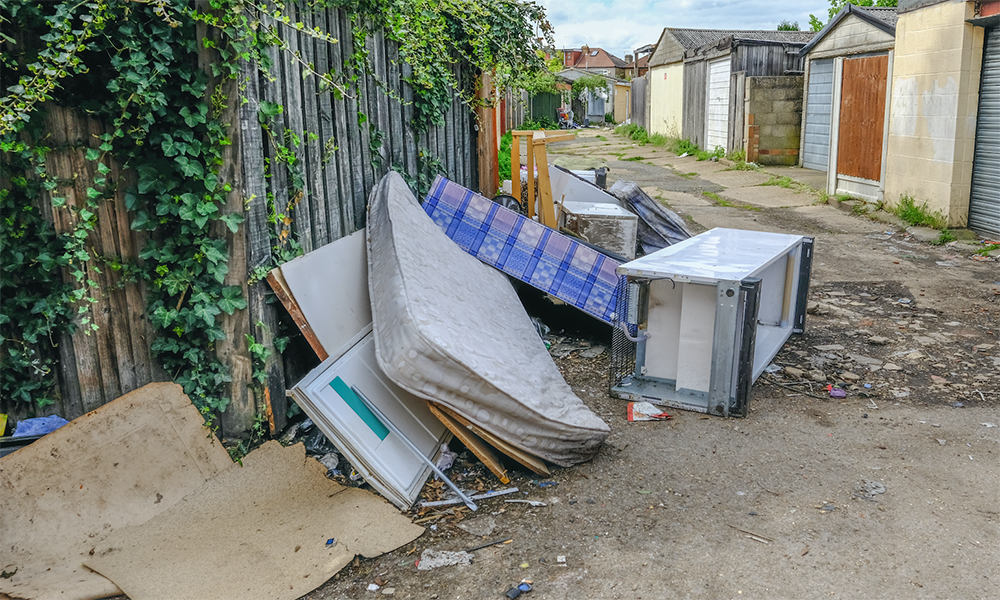Just 27% of waste crime incidents are reported

The Environment Agency’s National Waste Crime Survey 2025 highlights that nearly three-quarters of waste crimes go unreported, with over half of landowners and farmers affected. Officials and industry leaders are urging the public to report all incidents to help combat the growing threat of organised waste crime.
Landowners and farmers are being urged to report every incident of waste crime as new figures reveal only 27% of offences are reported. According to the Environment Agency’s National Waste Crime Survey 2025, released today (Wednesday 23 July), more than half (57%) of landowners and farmers have been affected by waste crime in the past year, but just 12% reported their most recent incident.
The findings highlight the scale of the problem, with networks of organised criminal groups increasingly targeting privately owned land, particularly in rural areas, to dump illegally collected rubbish.
Almost three quarters of waste offences go unreported, so we [the Environment Agency] urge industry and the public to help us stop waste criminals faster by sharing what they know about the people carrying out these heinous crimes
The waste industry, along with landowners and farmers surveyed, estimate that around 35% of waste crime is committed by organised groups seeking to profit from illegal disposal.
Steve Molyneux, Environment Agency Deputy Director for Waste & Resources Regulation, said: “Waste criminals’ toxic crimes cause widespread and significant harm to people, places and the economy. The Environment Agency is determined to use all our powers and resources to stop waste criminals, but we cannot achieve this alone.
“Our survey shows almost three quarters of waste offences go unreported, so we urge industry and the public to help us stop waste criminals faster by sharing what they know about the people carrying out these heinous crimes.”
Organised waste crime under scrutiny
Last year, a major Environment Agency investigation led to the conviction of three men involved in the illegal dumping of more than 26,000 tonnes of waste—equivalent to 2,170 double-decker buses—at 17 sites across the country. Criminal gangs had posed as legitimate waste operators, offering cut-price disposal services before abandoning the waste.
The survey also found that waste criminals are active nationwide, with respondents estimating that 20% of all waste produced in the UK may be illegally managed at some point in the supply chain—enough to fill Wembley Stadium 35 times.
Waste industry respondents who experienced waste crime reported significant financial losses. According to the survey, 52% faced costs exceeding £50,000 due to illegal waste sites, while 44% reported losses from illegal waste exports and 32% from large-scale fly-tipping.
“We will not stand and watch while our countryside is polluted by criminals who undercut decent businesses.”
Circular Economy Minister Mary Creagh emphasised that tackling organised waste crime is a priority: “Through our Plan for Change, this government will crack down on the waste cowboys, seize and crush fly-tippers’ vans, and clean up Britain.
“With the shocking scale of this challenge revealed today, we are tightening the net on the organised crime groups who exploit our broken waste system.
“We will not stand and watch while our countryside is polluted by criminals who undercut decent businesses.”
The government’s Plan for Change includes new legislation allowing rogue waste operators caught transporting and dealing with waste illegally to face up to five years in prison.
Industry calls for action
Dan Cooke, Director of Policy, Communications and External Affairs at CIWM and the Circular Economy Institute, called for greater public participation: “Waste crime causes misery and anxiety to communities wherever it occurs. It also damages local economies and undermines the professional recycling, resources and waste sector. These latest National Waste Crime Survey figures show the extent of the challenge we face and the need for renewed focus and action.
“CIWM encourages everyone to report suspicious activity or any incidents involving the illegal tipping of waste materials—wherever and whenever you see it. By reporting it to your local authorities or to the Environment Agency, you are increasing the chance of prosecution and of swift action to maintain the quality of local environments on which our economy depends.”
By reporting [waste crime] to your local authorities or to the Environment Agency, you are increasing the chance of prosecution and of swift action to maintain the quality of local environments on which our economy depends.
David Gudgeon, Head of External Affairs at Reconomy Connect, added: “These results are alarming and highlight that the UK continues to be plagued by rogue waste operators who cause severe environmental and economic harm to local communities. Waste crime is estimated to cost the UK economy £1 billion annually, underlining the scale of the problem and the urgent need for stronger action.
“The government’s recently announced crackdown on cowboy waste operators by giving councils powers to seize and destroy vehicles used by waste criminals and the introduction of the Digital Waste Tracking system in October 2026, which will monitor waste from households, businesses and industry, are important steps forward. However, these measures alone are not enough.
“To truly tackle the root of the problem, there must be a much greater focus on transitioning to a circular economy. Presently, too few materials are making their way back into the economy with most being lost to incineration or landfill.
“Closing circularity gaps by doubling down on recycling, reuse and resource preservation is the most effective way to protect local environments, boost economic resilience and future-proof businesses.”
